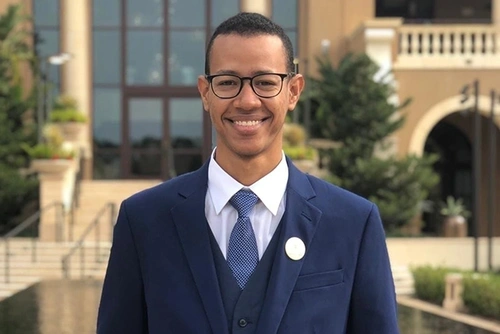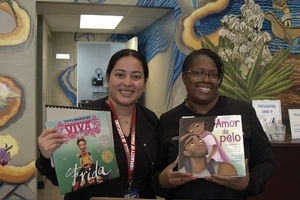To find yourself halfway across the world with no compass and needing to navigate academia: this is the experience of what Penn GSE alumnus Abdulrahman Bindamnan has coined the “zero-generation college student.”
Yet that is precisely what Bindamnan has done. And in doing so, he has discovered a passion for teaching non-native English speakers and writers about the craft of writing.
Born and raised in Yemen, where he spent his first two decades, Bindamnan was given the opportunity to study abroad in the United States through a scholarship from the Hadhramout Establishment for Human Development. Though he describes himself as having been ambivalent about making the journey — and his parents initially disapproved — the onset of the Yemeni Civil War propelled him to take a leap of faith and move to a country he did not know even existed.

It was upon landing at the airport in 2016 that Bindamnan began to experience the challenges that would later lead him to coin the term “zero-generation college student.”
“They sent me and my colleagues to this new country; we neither spoke good English nor had any cultural capital,” he recalls. “The experience has been at once interesting and challenging.”
Dropped into a country whose culture and language he knew very little about, Bindamnan, a native Arabic speaker, had to navigate not only the complexities of day-to-day life but also the intricacies of applying to and attending post-secondary education. And he had to do it without any support from his parents, who, though proud of the person he was becoming, remained in Yemen — and continued to deal with the struggle of living in a country at war with itself.
Learning a new language is difficult. Learning a new language while receiving your post-secondary education in that language is extraordinarily challenging.
“Me and my colleagues on the scholarship navigated academia as we went along,” says Bindamnan. “We knew little to nothing about how to apply to U.S. colleges and universities. So we just took it one step at a time, working by trial and error — and learning from those errors.”
Ultimately Bindamnan found his way to the University of Miami, where he received dual bachelor’s degrees from the Departments of Psychology and Religious Studies.
While he enjoyed his studies at the University of Miami, much of his experience there was local in scope. Interested in pursuing a master’s on the way to getting his doctorate and looking to apply an international lens to his work, he applied to Penn GSE and its renowned International Educational Development Program (IEDP).
“I sought faculty who would understand my background,” says Bindamnan. “That is why the program at Penn GSE appealed to me. Professor Daniel Wagner, the founding director of the IEDP, had even conducted short-term research about Quranic learning in Yemen.”
The IEDP prepares students with distinctive skills for working in the field of education in developing and marginalized contexts worldwide. Bindamnan placed his geographical focus on the Arab Middle East, owing to his interest in the region’s culture, history, and intellectual and social development.
It was at Penn GSE that Bindamnan received critical feedback from one of his professors, who suggested that the quality of his writing was undercutting the quality of his ideas. In response, he began to invest heavily in his mastery of English academic writing.
“Frequently as someone who is a non-native English speaker, you meet professors who will sympathize with your non-native status and accept your work even when the quality of the writing is neither clear nor persuasive,” says Bindamnan. “Fortunately, one of my professors suggested that my approach to writing and argumentation obstructed native English readers from assessing the quality of my ideas. Ever since I received that feedback, I embarked on a journey toward clear and powerful writing.”
His experience urged him to think about the nature and complexities of learning and language. Pursuing post-secondary education in English after receiving two decades of education in his native language of Arabic was enormously difficult, but it also provided him with rare perspective. After all, he notes, becoming proficient in academic English is a years-long process even for those who speak the language natively — but here he was, making it work. Bindamnan credits the Reader Expectation Approach of George Gopen, Professor Emeritus of the Practice of Rhetoric at Duke University, with helping him gain better control of written English, and Gretchen Martens, an academic mentor and happiness expert, with helping him through academic mentorship and editorial support.
Bindamnan received his Master of Science in Education (MSEd) in International Educational Development in December of 2021. Now this self-professed zero-generation college student, who arrived in the United States only six years ago and had to start from scratch in a culture and language he barely understood, stands on the precipice of starting his doctorate.
As he honed his craft and applied what he learned about education at Penn GSE, Bindamnan awakened a passion for not only becoming a clearer and more effective writer but also in teaching prospective students how to write with clarity and grace.
While he begins to pursue his doctorate in International Educational Development, he has started a service — Write it Right — through which he helps fellow students and interested clients become better writers.
“I have worked with many students since launching the website,” says Bindamnan. “I help students apply to programs, assist them in their academic studies, help them translate from Arabic to English. Ironically, I even had a few native English speakers reach out for help.”
“Some of the students with whom I worked make some of the same mistakes I made back when I was at the beginning of my journey,” says Bindamnan. “I see myself in them. I find that experience intellectually rewarding.”
Media Inquiries
Penn GSE Communications is here to help reporters connect with the education experts they need.








